Republicans on the House Budget Committee urged congressional leaders on Thursday to include spending controls in any discussion of raising the nation’s borrowing limit, saying Congress needs to tackle inflation caused by President Biden’s “harmful spending agenda.”
“With the debt limit expiring this month, Congress should take this opportunity — as it has numerous times in the past — to seriously consider and implement deficit reduction policies that will protect the economic health of our nation and taxpayers’ pocketbooks,” Rep. Jason Smith of Missouri, the top Republican on the committee, wrote in a letter to House and Senate leaders of both parties.
The push for mandatory spending restraint comes as Senate Republicans said this week they won’t vote for any increase in the nation’s debt ceiling, a move that would force all 50 Senate Democrats to approve more borrowing on a party-line vote.
In 2019, Congress and the Trump administration suspended the current debt limit for two years, an extension that expires July 31. Biden officials say the government can use various budget maneuvers to postpone the date on which Washington would run out of money until sometime in October.
The Congressional Budget Office estimates that the federal deficit will reach $3 trillion in the current fiscal year that ends on Sept. 30, topped only by the $3.1 trillion deficit in fiscal 2020.
The projection for red ink in the current year doesn’t include Mr. Biden’s plans for roughly $4 trillion in spending on infrastructure and social programs. Republicans argue that the government’s spending spree is responsible for a recent surge in inflation, to an annual rate of 5.4% — the highest in 13 years.
“President Biden and congressional Democrats are attempting to enact at least a $3.5 trillion spending plan and potentially trillions of dollars more which includes policies that will harm working Americans,” the House Budget Committee Republicans wrote. “This harmful spending agenda, coupled with CBO’s current projections, demonstrates that Congress must take action to rein in out-of-control spending and enact policies that foster fiscal responsibility.”
The White House pointed to an International Monetary Fund report on Thursday as proof that Mr. Biden’s economic policies are working. The report said, “unprecedented fiscal support is quickly restoring the economy back to full employment and generating positive outward spillovers to the world economy.”
But the White House didn’t note this downside in the report about the costs of massive spending: “The path for public debt is far higher; the current account deficit has grown; and very accommodative financial conditions have led to increased corporate and nonbank leverage and rising valuations across a range of assets.”
The proposal for built-in spending budget constraints has detractors even in the GOP. The Budget Control Act of 2011 was criticized by Republicans for imposing spending limits on defense. Senate Minority Whip John Thune of South Dakota raised concerns Thursday about returning to any budget controls that would curtail spending on national security.
“I’m all for spending caps, especially on non-defense domestic discretionary spending, but the national security number will be really important for Republicans,” Mr. Thune told reporters. “There are a number of budget reforms that our members will be supportive of, in the context of the vote on the debt limit. But if the scenario was the Democrats moving on the reckless tax-and-spending spree bill, then … they won’t be doing it with Republicans.”
Senate Democrats plan to spend $3.5 trillion on new social programs without any Republican support by using special “reconciliation” budget rules. They are crying foul that the GOP won’t go along with another increase in the nation’s borrowing limit.
Senate Majority Leader Charles E. Schumer of New York called Senate Minority Leader Mitch McConnell’s position on the debt ceiling “shameless, cynical, and totally political.”
“This debt is Trump debt. It’s COVID debt,” Mr. Schumer said Wednesday. “Leader McConnell should not be playing political games with the full faith and credit of the United States. Americans pay their debts.”
Mr. Biden said he doesn’t have an answer for the apparent impasse that could stop his big-spending agenda.
“There are going to be a couple of very difficult decisions that are going to have to be made to get through the end of the year,” Mr. Biden said Wednesday night. “And one of them is the debt limit and extending the debt. I hope we can get by it.”
The total U.S. national debt stands at more than $28.4 trillion. The national debt was $19.9 trillion when President Trump took office in January 2017. By October 2020, it has risen to $27 trillion — an increase of nearly 36% in less than four years.
Two months after Mr. Trump left office, it reached a new high of $28 trillion. In eight years under President Obama, the debt rose by $8.6 trillion, or 74%.
• Dave Boyer can be reached at dboyer@washingtontimes.com.




Please read our comment policy before commenting.